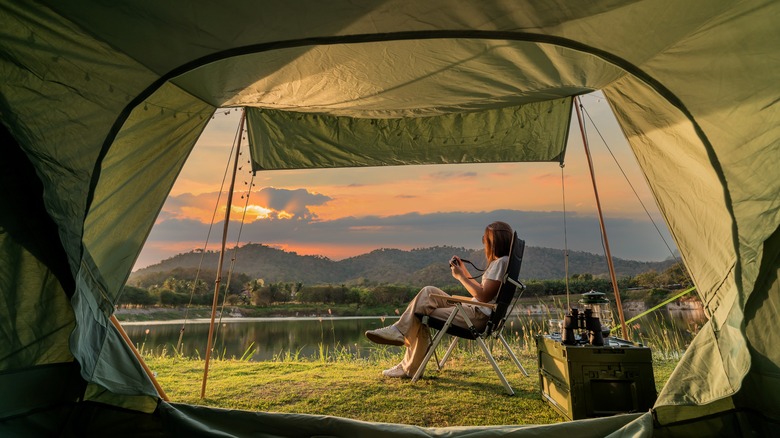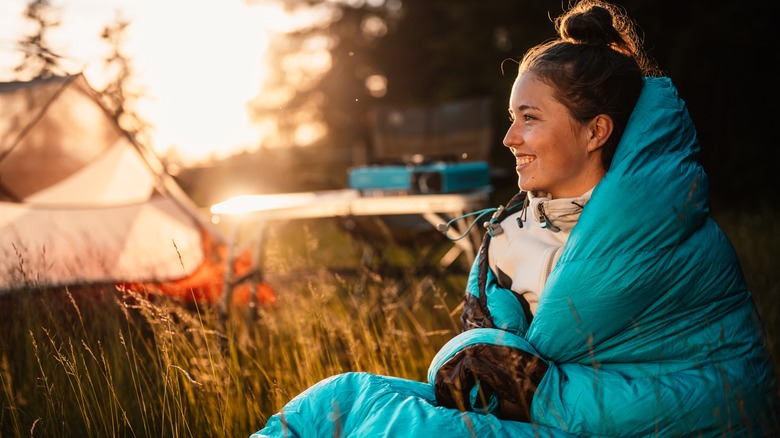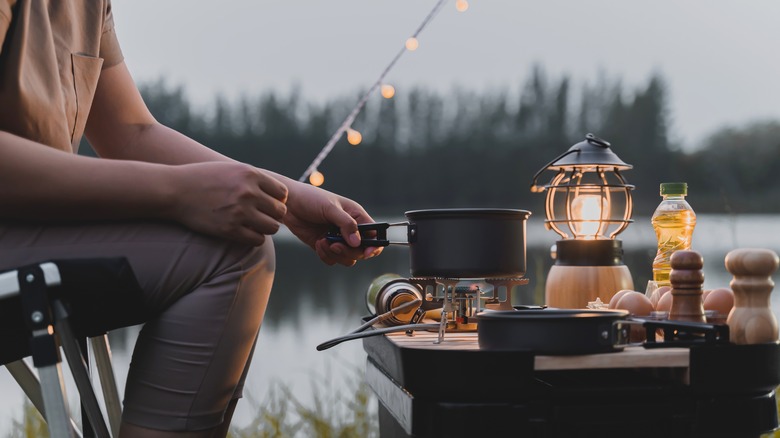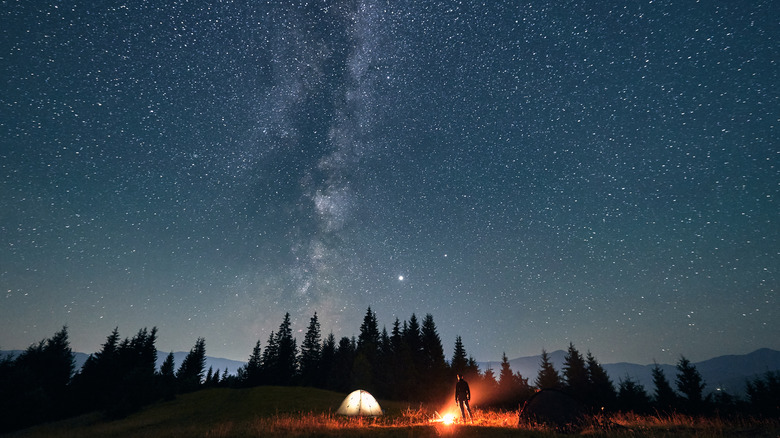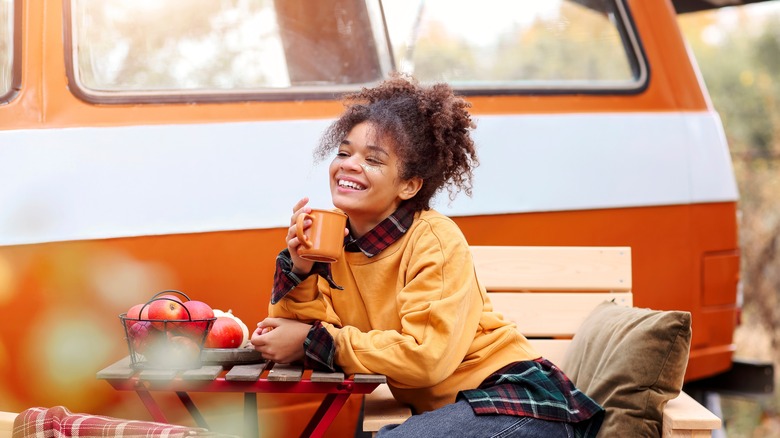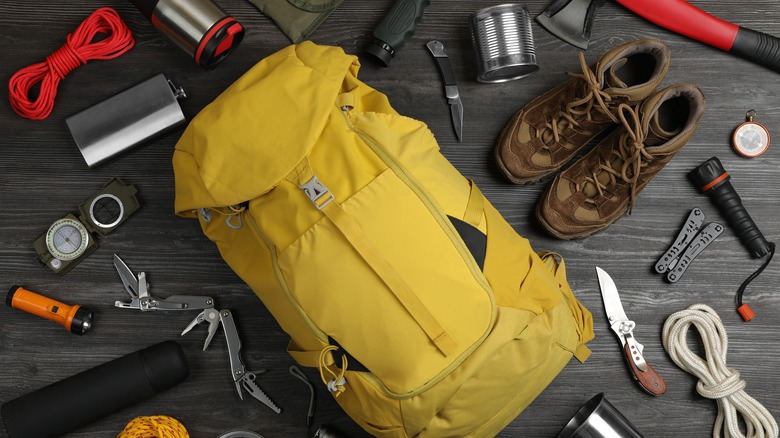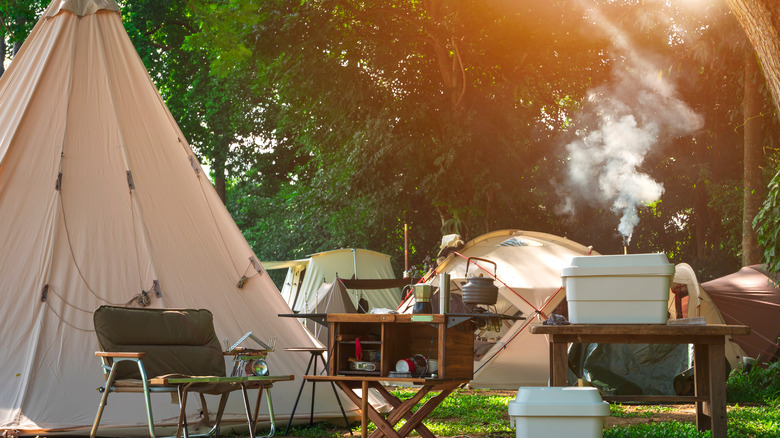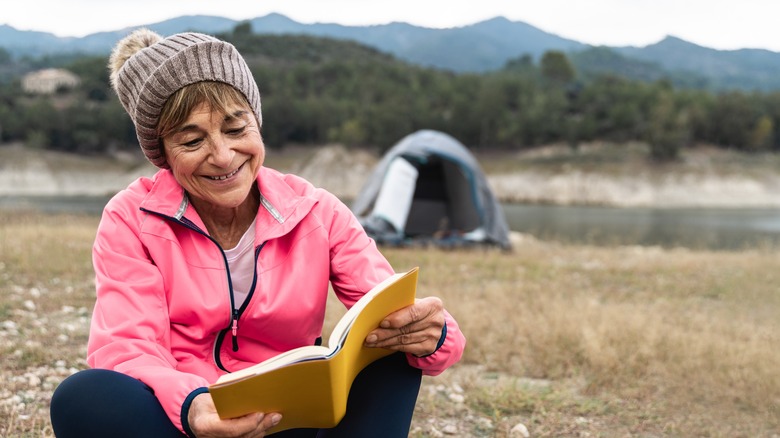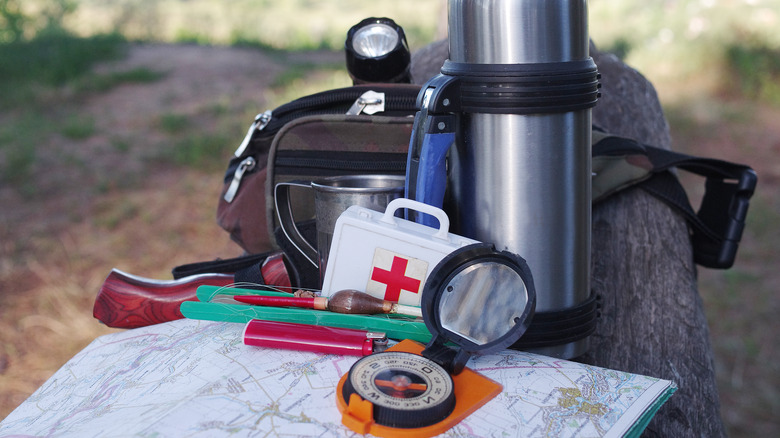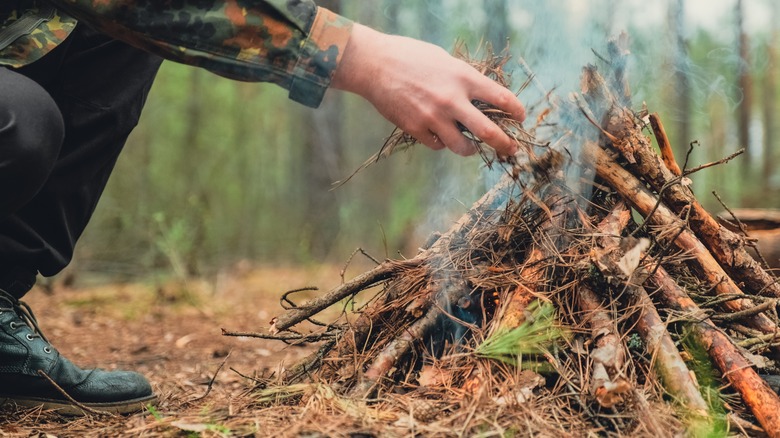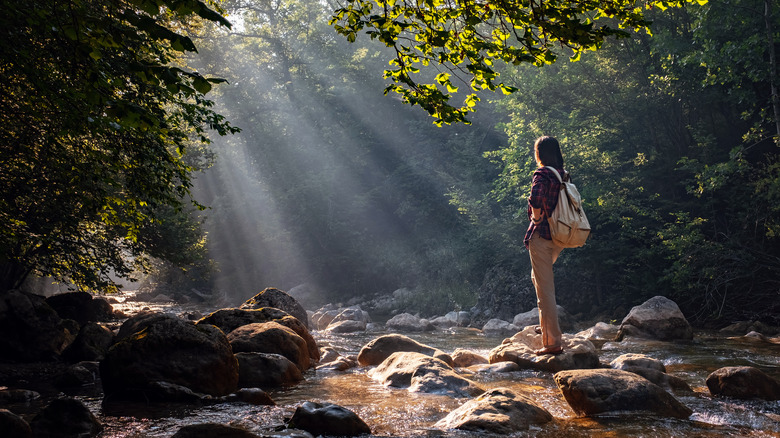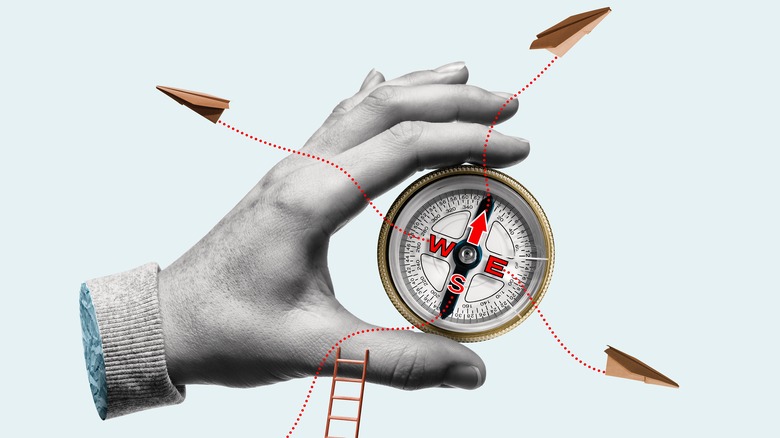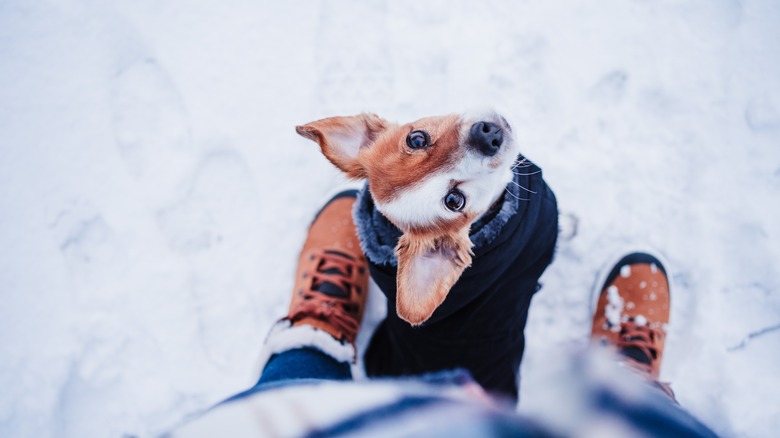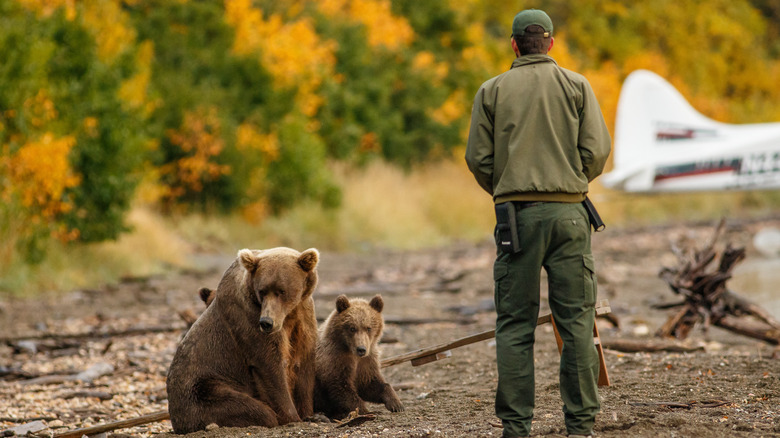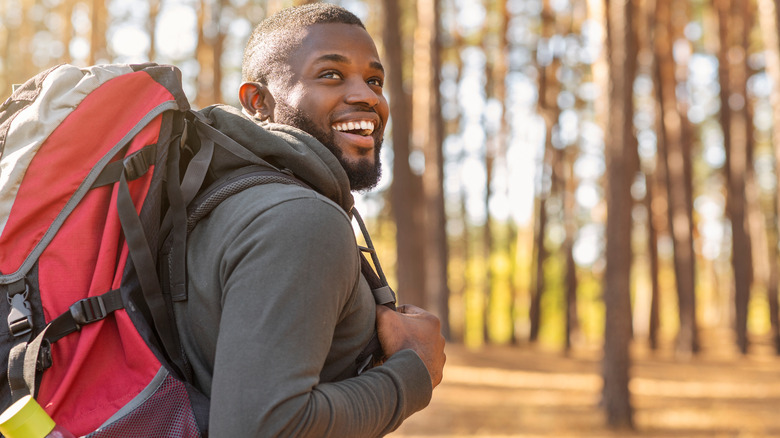Solo Travel: How To Master Camping On Your Own
There are many rewarding reasons to camp — setting up camp in the outdoors offers an experience to be completely enveloped by nature. Whether you're staying in a tent, van, airstream, or RV, you'll be surround by the natural environment. Camping provides you the opportunity to escape light pollution for stunning stargazing and a chance to see the Milky Way. You might cross paths with majestic wildlife and you'll soak up the sounds of nature, from soothing streams to song birds or maybe even howling coyotes.
Not only that, but spending time in nature is good for your health, both physically and mentally. The physical activity of camping, like setting up a tent or chopping firewood, counts as a work out. Plus, research shows that the natural world boosts your mental outlook and helps reduce depression (per National Park Service). Camping also offers you the opportunity to disconnect from technology — if you have no cell service, it's much easier to swap your phone for a good book.
The pros of camping solo
When most people think of camping, they see it as a group activity. While it can be fun to camp with others, it can also be an exciting adventure to camp by yourself. Camping alone eliminates the potential stressors that come with coordinating or compromising for others. When you camp on your own, you get to move at your own pace and only do what truly resonates with you. This provides you an opportunity to check in with yourself and directly honor your wants and needs. In general, the solitude that comes with camping solo helps you reconnect with yourself; you'll have more time and space to dive inwards without the distractions of others, technology, and city life (via KOA Blog).
Camping alone will also teach you how to be more independent, and in turn, can help build your self-confidence. You will be inspired to learn and master all of the skills required for camping; since you will be by yourself, you don't have the chance to rely on someone else to set up the tent or start the fire. Let's explore some important tips and tricks for camping solo.
Start small
If you've never been camping before, it can be quite intimidating to have your first camping trip be a solo expedition. Instead, try to work your way up to it by practicing camping with others. Even better if you can go with friends or family that have camping experience and don't mind teaching you a thing or two. Learning by doing can help you hone your skills, and repeating them can support your efforts toward becoming a pro. Don't feel bashful about consulting guidebooks, YouTube, Reddit, or other resources to help you learn skills, either.
Your first solo camping trip doesn't have to be some epic backcountry trek. Being out in the middle of nowhere far away from resources can feel overwhelming for your first time camping by yourself. Even with adequate planning and preparation, you may find that camping on your own requires different skills that you haven't thought of or needed before (per KOA Blog). Be kind to yourself and start small to help you build your confidence and make camping alone feel more accessible, which will ultimately build the momentum to achieve your goals and dreams.
Embrace the fear and discomfort
Let's face it — camping alone can feel scary. And that's OK. Being alone in the middle of the night listening to rustling bushes outside your tent when you have to pee are the things horror films are made of. John Steinbeck wrote: "Oh, we can populate the dark with horrors. I knew beyond all doubt that the dark things crowding in on me either did not exist or were not dangerous to me, and still I was afraid" (via The Washington Post). Oftentimes, the things that feel scary aren't based in reality, rather it's our thoughts that frighten us. Either way, we can know our fear is irrational and still be scared anyway.
First off, if you feel afraid when camping alone, know that you are not the only one who feels this way. Reassure yourself that it's normal and that you will be okay. There is no simple solution to overcoming this anxiety, but practice and patience with yourself can help (via KOA Blog). The more time you spend alone in nature can build your confidence and help you learn about the common sounds of the forest, so you can recognize what is a threat and what is simply a branch snapping from an animal. If you don't have a dog, maybe a good friend will let you borrow theirs for your trip, so you can rest easy knowing they will bark to warn you of any real threats.
Pick somewhere you feel comfortable
There are several different ways to camp, from car camping to hike-in spots or even backpacking. There are also established campgrounds that often require prior reservations and come with designated spots with amenities like fire pits, picnic tables, bathrooms, and sometimes showers. Usually there is a camp host on location that can answer any questions or help you if you need. Or you might opt for dispersed camping in a more remote, isolated location that provides solitude and a free campsite, but no bathrooms. Consider what amenities you might want and what type of camping experience you desire. When camping alone, some people feel comforted by having other people nearby, while others do not (via The Washington Post).
Again, it's okay to start small. If you've never been backpacking before, maybe plan your first solo camping trip at an established campground so you can work on your skills with the safety net of a helpful hand nearby. Car camping can be beneficial because you can bring extra items without having to completely unpack the whole car and carry everything to your campsite. If camping alone feels intimidating, maybe try glamping instead for your first time, then work your way toward a campground (per Treeline Review).
Make a packing list
It's important to bring your essentials, but also to pack lightly. Remember, you only have to pack for one person and you will be carrying everything on your own. That being said, you don't want to forget any key items. So what's on your camping packing list? First off, you will want a tent, complete with a rainfly and tarp or tent footprint. You'll also need a comfortable sleeping pad, sleeping bag, extra blankets in case it gets chilly, and a pillow. Also, be sure to bring lights, including lanterns and a headlamp (per Treeline Review). Other great items to have include a camping chair, portable table, camping stove, fuel, cooking supplies, portable charger, fire starting tools, trash bags, food, cooler, toiletries, toilet paper, a multi-tool, and first-aid kit.
One of the most important items to pack is water. When camping, it's generally recommended to bring at least 3 gallons of water per day — plus more if you plan on doing physical activities like hiking or want to use it to wash your dishes, hands, and more. You can check beforehand to see if your campground provides potable water, but it's wise to bring water no matter what, in case anything goes awry. A reusable water jug is a sustainable option and is a good investment for future outdoor adventures. It's also a good idea to bring a water filter in case you need to filter some from a stream or lake.
Bring back-up items
There are some things that can make or break a camping trip — like forgetting to pack your tent. The tricky thing about camping alone is that if something breaks, or if you forget to pack something, you won't have friends or loved ones with you to lend you something. It's a good idea to plan on packing back-ups of essential items like lighters, fire starters, water filters, batteries, fuel, stoves, and whatever else you really don't want to do without.
Exploration Solo recommends looking at every piece of gear that you pack and asking yourself, "What would I do if this broke?" For example, if something goes wrong with your tent like a pole breaks or the tent tears, you might pack a hammock as a backup plan. Or you could research and practice how to set up your own shelter using a tarp or resources from nature.
Pack comfort items and entertainment
While packing essential items is crucial, don't forget to also pack fun things you love! Sure, it's important to have a tent and water, but you also want to have a good time. Bring things that will provide you comfort and joy, like luxurious food, wine, or cozy blankets (via The Washington Post). Also, keep in mind that you'll probably want some entertainment items. After all the big tasks are done, like setting up camp and starting the fire, how do you want to spend your time?
Some ideas of items to bring might include a kindle or book, a journal and pen, or an adult coloring book (per Treeline Review). You may not have cell service, so plan ahead and download podcasts, music, or guided meditations. If you're an artist, maybe you pack your camera to roam the area and take photos or bring a sketchbook and pens or paint.
Safety first
One of the top things on your packing list should be a first-aid kit. Make sure this kit includes a knife, band-aids, gauze pads, tape, ace bandage, space blanket, and antiseptic ointment. You may also want allergy meds, aspirin, and specialty items like snake venom antidotes or bear spray, depending on where you are going (via Passport Symphony). In addition to packing your first-aid kit, make sure you know basic first-aid and survivor skills. To learn these skills, you may be able to find first-aid training courses through local organizations near you, or you could see what the American Red Cross offers.
Other safety measures to consider: navigation gear like a GPS, compass, and physical map; extra food and water; a flare, whistle, or signal mirror; and a satellite phone if you need to contact help but don't have cell service (per The Washington Post). It's also a good idea to have emergency tools for your car, like a spare tire, jumper cables, and snow chains.
Make a skills list and master them
One of the first steps to camping on your own is being realistic about your skills. Be honest about what you know and what you don't, because this will help you focus on what you need to work on. Practicing camping with others should help you get down to the basics, like how to pick an ideal campsite, pitch a tent, set up camp, and build a fire (via KOA Blog).
It's also a good idea to practice using your gear before you go out alone in the wilderness, especially if you have a fancy new compass or camping stove you've never used before (per Exploration Solo). You'll also want to plan a little further, like how to find clean water and filter it, in case you run out or something goes wrong with your primary water source. Your essential skills list will vary slightly depending on the type of camping you plan on doing since car camping versus backcountry camping will require some different tasks.
Make a plan and a back-up plan
Before you take off, you'll want to do some research on where you are going. Make sure you look up the directions on how to get there and download the map so that you have access to it when you don't have cell phone service. If you're planning on hiking, research the area and the trails (via Passport Symphony). Are there dangerous animals that live in that area that you should be aware of? Are there other potentially hazardous insects and plants, like venomous spiders or poison oak? Should you pack bug spray for mosquitoes, biting flies, and other bugs? Looking into the area will help you answer these questions and be prepared for your trip.
It also doesn't hurt to think of "what if" scenarios and create backup plans in case something goes wrong. What if my phone breaks? What would I do if I got lost? What would an alternate route be if there was a road or trail closure?
Share your location with friends, but not online
Once you have your plan on where you are going and how long you will be gone, make sure to inform friends or family. Experts agree that telling at least two people your camping location, as well as your planned departure and return times, is the best course of action, according to The Washington Post. That way, if something goes wrong and you don't return when you specify, your loved ones will be able to alert emergency services and give them an exact location of where they should go searching for you.
Also, consider waiting until the end of your trip to post on social media — or if you do post while camping, don't attach your location. While rare, there have been reports of people out in the woods who have been attacked after posting their whereabouts on social media, like the tragic story of two hikers who were murdered in Morocco in 2018 (per The Washington Post).
Check the weather beforehand
While it may seem obvious, you'd be surprised how easy it can be to forget to check the weather forecast when you're busy packing for a camping trip. Sometimes it can be hard to find the weather forecast to your exact destination, especially if it's in the middle of the forest. Locate the nearest town or area to your camping spot to check the weather to help give you an idea of what to expect and how to prepare. Be sure to check again right before you leave, just in case something has changed since weather predictions are most accurate one day in advance (via Treeline Review).
Pack according to the weather and bring things you think you may not even need, like a raincoat or thick jacket just in case. Weather can be unpredictable, especially if you are traveling in an area that is known to experience sudden storms or changes in weather patterns.
Know what to do if you see a wild animal
Any time you go out in nature, you are entering the homes of wild animals. Spotting an animal in its natural habitat can be awe-inspiring, but remember to never approach an animal in the wild, no matter how docile or friendly it appears. Any animal may attack if it feels threatened. It's important to know how to react when you see wildlife, especially if it's a bear, mountain lion, or rattlesnake, which have been reported to attack humans on occasion. When you're researching your camping location, be sure to look up what wild animals frequent the area so you can be prepared with how to proceed.
If you spot a bear or mountain lion in the wild, remember to make yourself large and loud by raising your arms in the air and shouting. Don't run away, slowly back away from it (via SCSPCA). In addition, the National Park Service advises against squatting or bending over if you see a mountain lion to avoid looking like prey. And if you ever get bit by a rattlesnake, do not try to suck the venom out — that is a myth. Also, don't try to apply a tourniquet or ice. Instead, keep the area still and below the heart and seek medical care immediately (via Forest Service).
Leave no trace
One of the biggest things to remember when camping is to leave no trace. This means minimizing your impact on the land and leaving nothing behind. Whatever you pack in, you pack out — don't leave any trash, including fruit peels and nut and seed shells. Bring a plastic bag to pack out your toilet paper and don't attempt to bury it. Wherever you go, try to stay on existing trails and avoid forging new ones that squash the local flora — this goes for both hiking and camping. Never try to build or create the perfect campsite. Leave the natural world as you find it: don't take home souvenirs, dig trenches, or build unnecessary structures (via U.S. Fish & Wildlife Service).
If you build a campfire, keep it small and use existing fire pits when possible. Only use wood and branches that have fallen to the ground and never harvest material or take pieces from living trees or plants. Be sure to put your fire out completely by covering it with water and dirt. When you leave a natural area, it should appear like you were never there at all.
